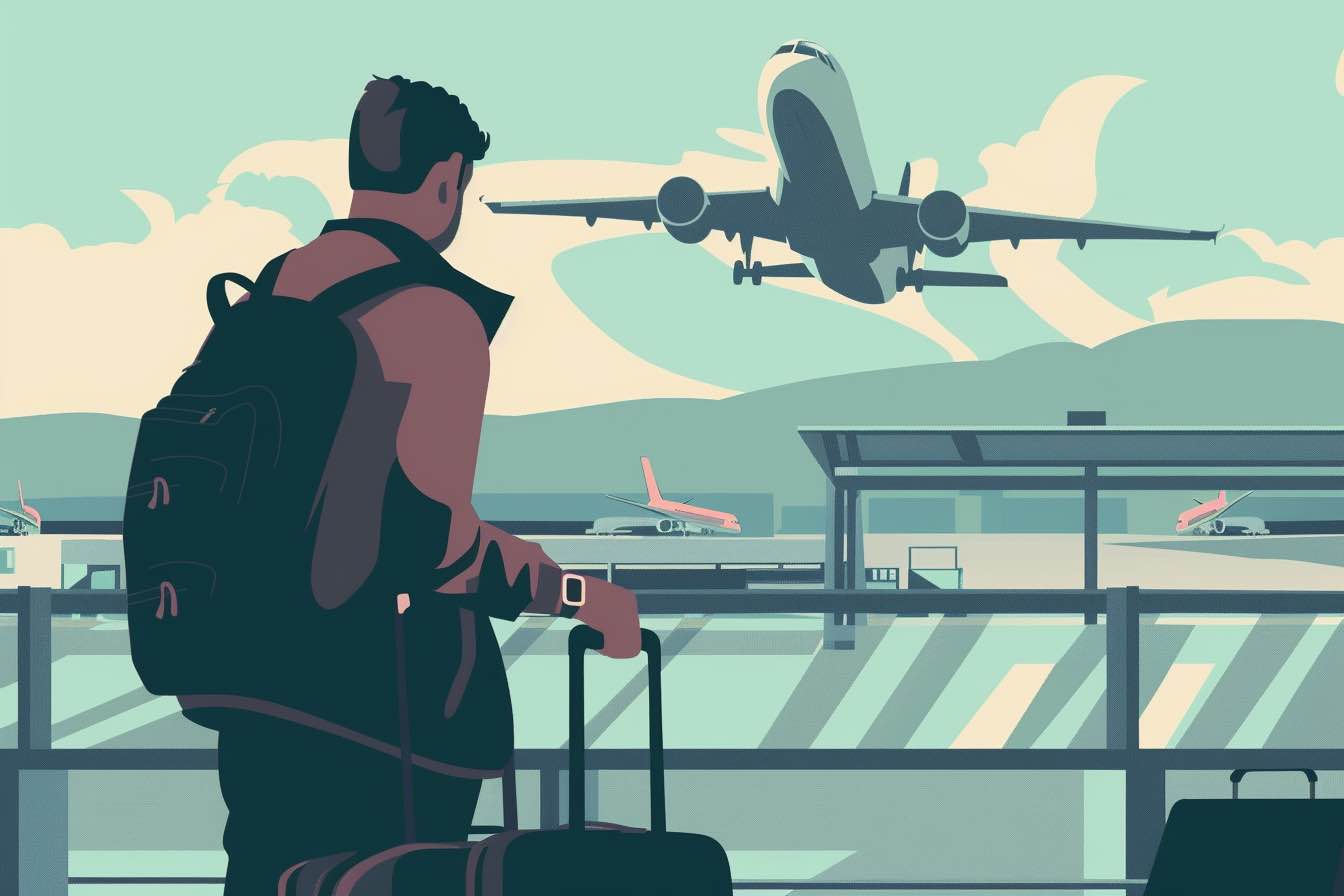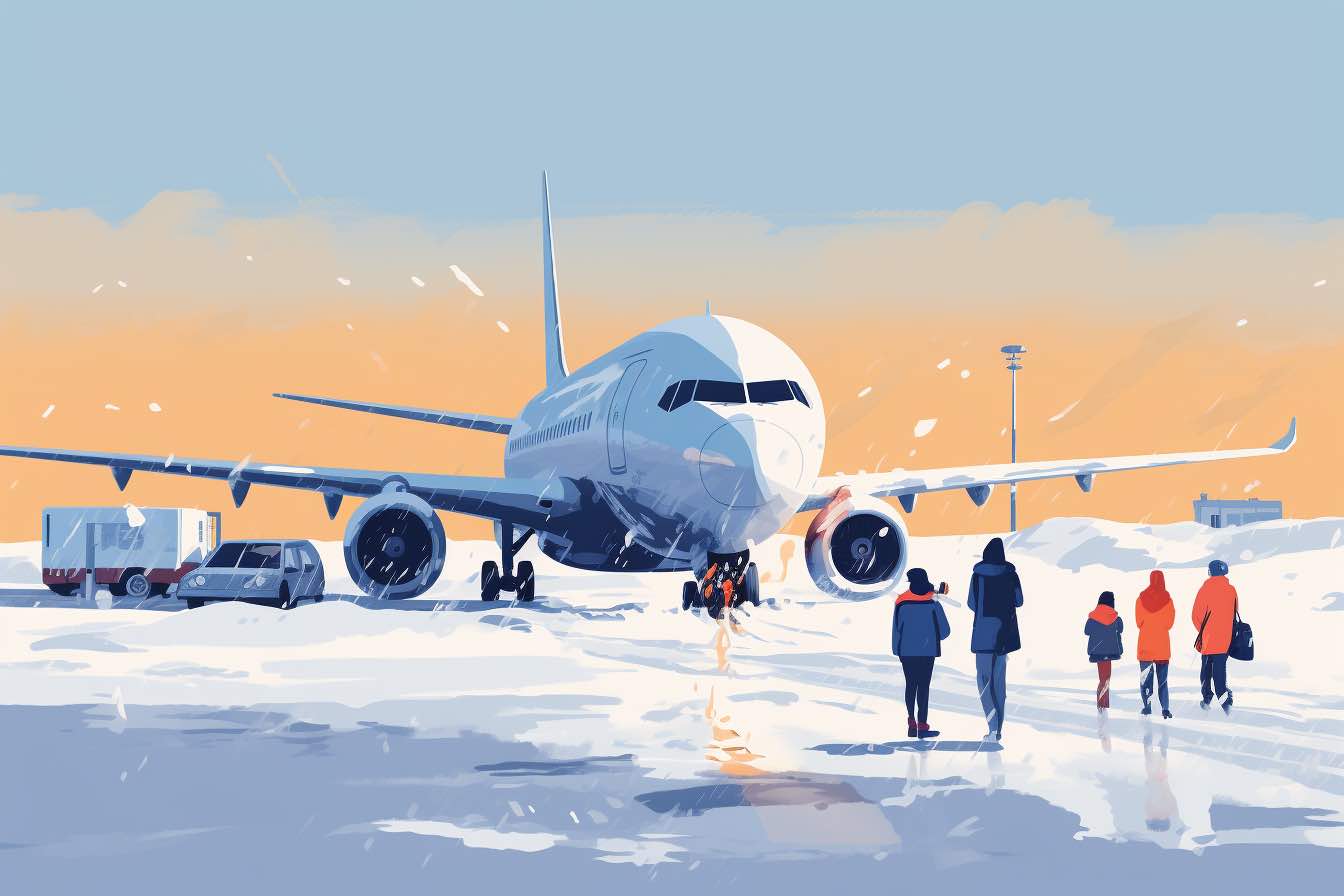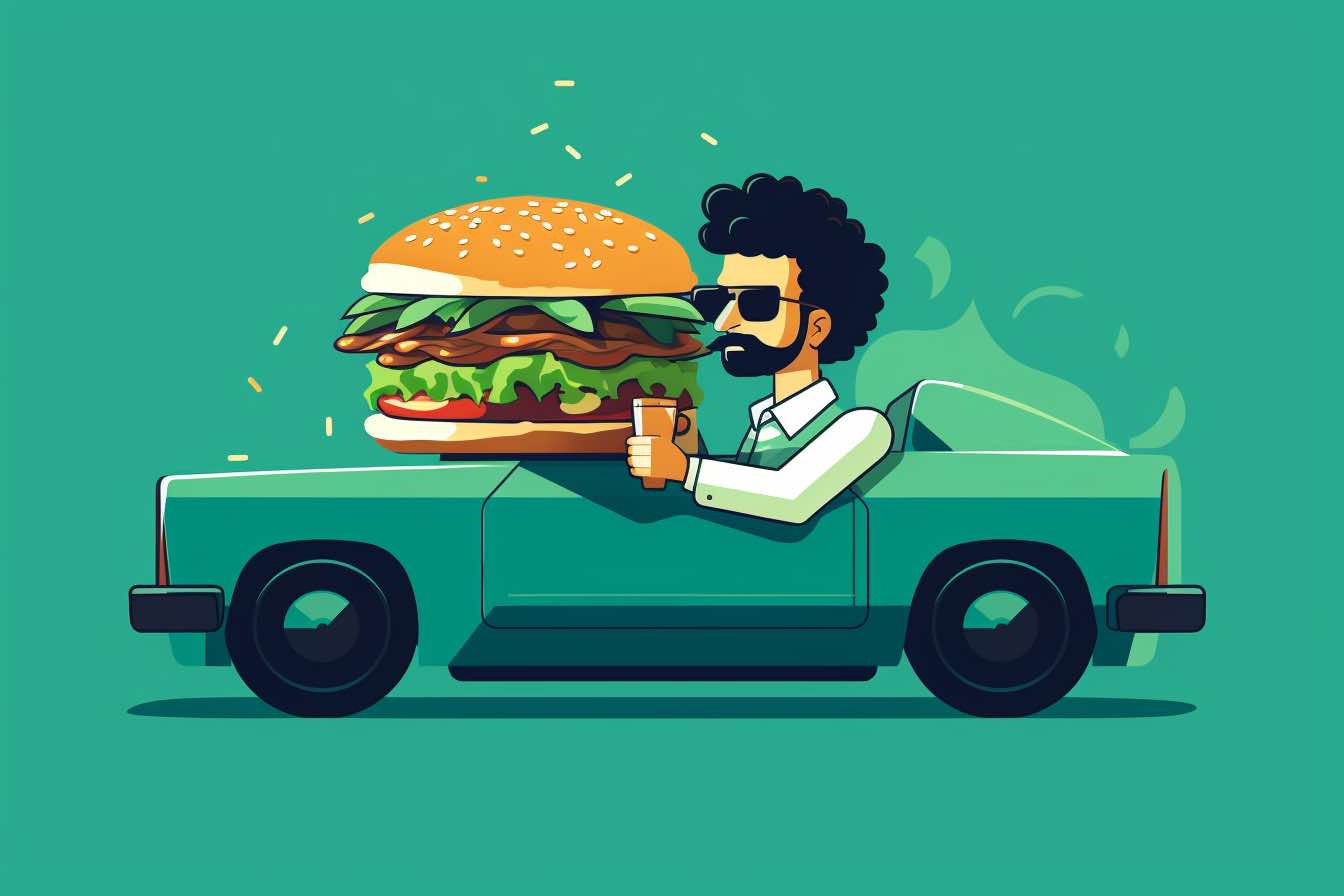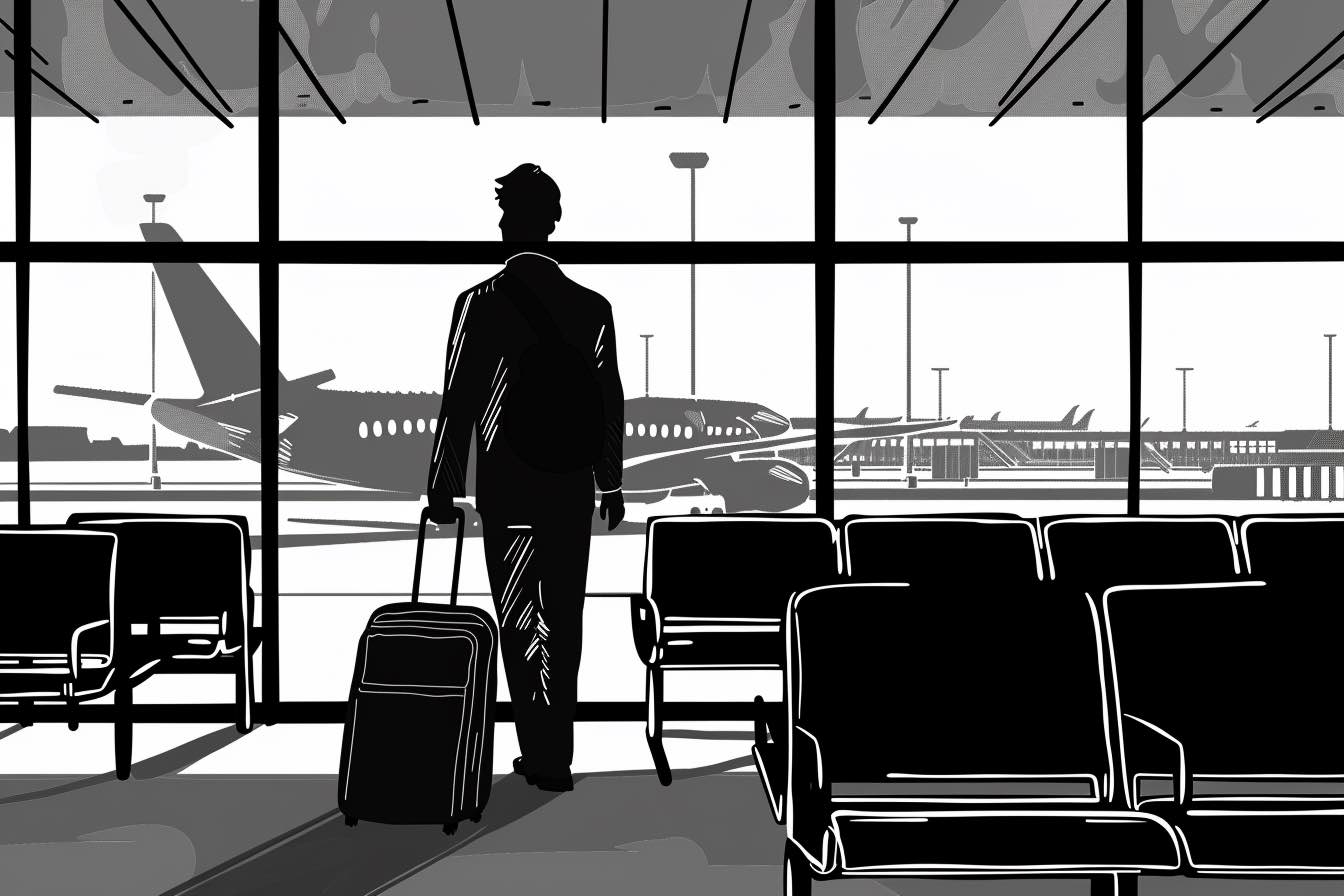If your flight is canceled or delayed, do you deserve a refund?
Yes, you do — usually.
But when do you get your money back, and under what circumstances? That depends.
In this guide, I’ll show you:
- How to avoid getting stuck with a canceled or delayed flight.
- How to find out about a possible delay or cancellation before your flight.
- What to do if you’re at the airport and you flight is canceled or delayed.
It could happen to you
Delayed and canceled flights are happening with greater frequency. Consider Evelyn Fink’s recent flights on American Airlines from Dallas to Anchorage. Over several months, the airline repeatedly canceled her flights and then rebooked her.
Fink finally asked for her $569 airfare back, but her online agency, Expedia, sent her a series of denials. No, sorry — they were keeping her money.
She was furious.
Who was right?
How to avoid getting stuck with a canceled or delayed flight
Many airline delays and cancellations don’t happen at the last minute. You can find out about them days or weeks ahead of time and change your schedule.
Here’s what you have to know about canceled or delayed flights
Canceled and delayed flights can be complicated. But let me simplify them:
- If an airline cancels your flight, it must offer a full refund OR a new flight of the airline’s choosing. It may also owe you some compensation depending on where you’re flying or the reason for the delay. By the way, that’s also true if the airline ends service to a destination, as American Airlines recently did to several cities.
- If an airline delays your flight, your airline owes you less. There’s no requirement that your airline keep its timetable in the United States. For longer delays, though, federal law requires that the airline offer a full refund. If your flight is to or from a destination in Europe, you may be eligible for more compensation.
Fortunately, most cancellations happen with time to spare. For example, Fink learned about her dropped American Airlines flight weeks before her departure. That gave her plenty of time to contact my advocacy team for help.
(By the way, if you have a seemingly unsolvable problem with a canceled or delayed flight, let us know. Here’s how to reach us. ) I’ll have the resolution to her case in a moment.
How to avoid flight cancellations and delays
You can avoid trouble with a flight cancellation by taking a few simple steps:
Look before you book
A site called AirLegit allows you to view historical flight data. You can find out if your flight is frequently delayed, and by how much. FlightAware, another helpful tool, doesn’t show delays to nonpremium users. But it displays flight status. You can see how likely a cancellation or delay is by looking at these numbers before making travel arrangements. Avoid chronically late or canceled flights.
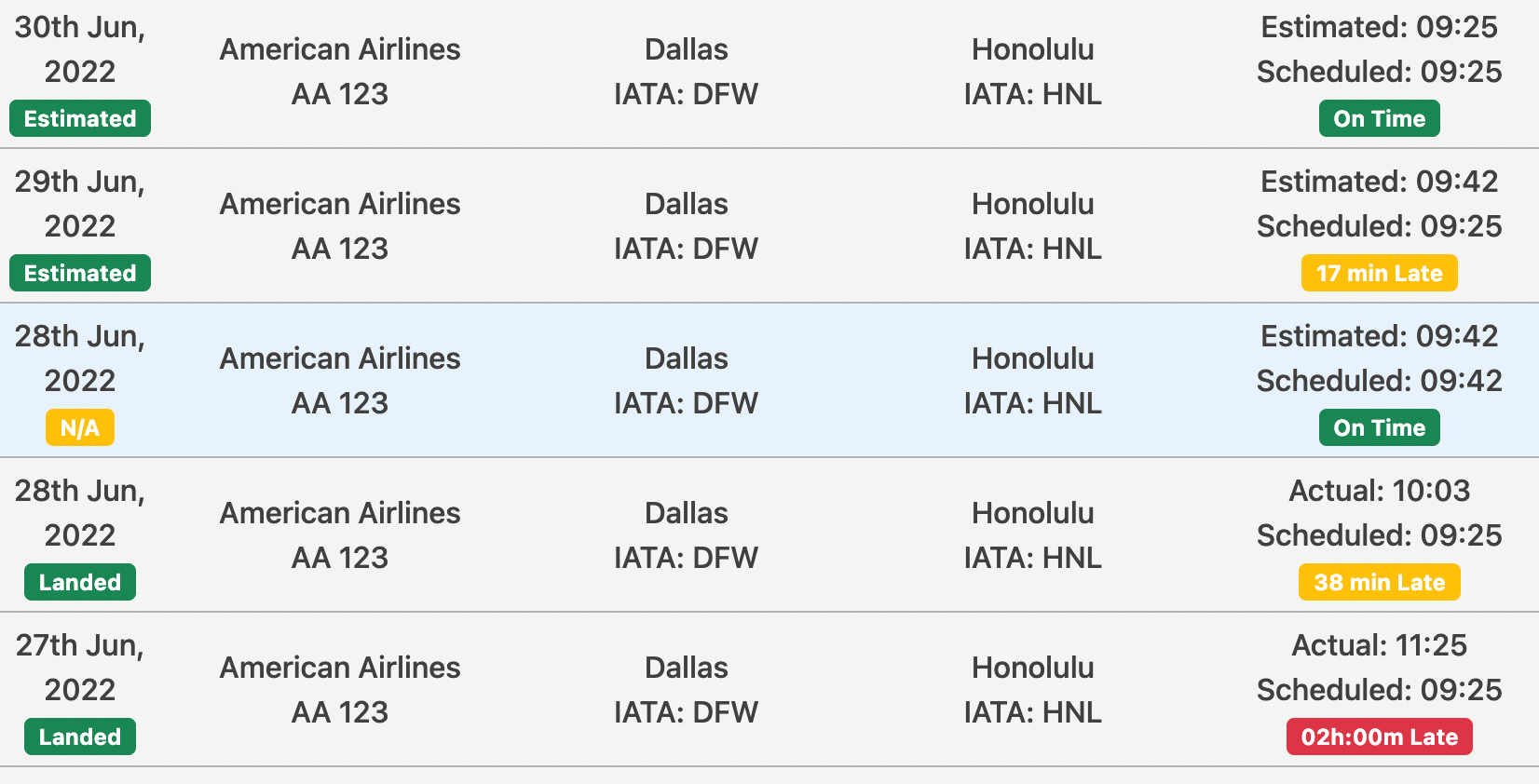
Make sure your airline or travel agent has your phone number and email address
Also, sign up for your airline’s text alerts. If your flight gets canceled or delayed, it will try to notify you. We receive a fair number of cases from passengers who didn’t provide the correct email or phone number. They never found out about a cancellation.
Download your airline’s app
The airline’s app will also notify you of any changes. You might also have the option of quickly selecting a replacement flight through the app. That could save you some time waiting in line or on hold.
Check in 24 hours before your flight
That way, your airline knows you are planning to fly. But often, it will also have an update on your flight status. Review your departure time carefully to ensure it aligns with your itinerary. Flight schedules change frequently, but if you have a day to make other arrangements, rescheduling your flight is much easier. You don’t want to arrive at the airport and find out your flight is canceled or delayed. Plus, other passengers who didn’t wait until arriving at the airport now may have snagged the last seat on an alternative flight.
How to prepare for a possible delay
Last-minute delays are as unpredictable as the weather. To avoid getting stuck, you’ll want to pack a few extra items:
- A fully charged cell phone. A cell phone is a must-have tool during a last-minute delay. You’ll use it to communicate with your airline or online travel agency. Make sure yours is on 100 percent before heading to the airport. Don’t pack your charger in your checked luggage; you may need it during a delay. Also, consider buying a portable charger in case all the outlets are in use.
- More food. Don’t go to the airport without food. That’s especially true if you’re traveling with kids. You don’t want to get stuck at the airport with only expensive (often unhealthy) food options. (Leave the yogurt and applesauce at home, though. The TSA will confiscate it because it’s a liquid.)
- A change of clothes. Assume you will have to spend the night in an airport hotel or sleeping on a bench without your checked luggage. So pack a change of costume — make that two changes if you’re traveling with young kids. Parents, you know what I’m talking about. Note: If you’re traveling during the winter, and you’re making a stopover, make sure you bring plenty of weather-appropriate clothing. If you’re stuck in a hub city for a day or more, you’ll thank me.
How can you find out about a possible delay or cancellation before your flight?
There are several tools that can give you a good idea if a cancellation or delay is coming.
AccuWeather offers a flight weather forecast that will tell you if a delay is likely. Most last-minute flight delays and cancellations are weather-related.
FlightAware allows you to track your flight status and receive alerts if there’s a delay. A basic subscription to its service is free.
FlightStats also allows you to receive information about your flight status. A premium version will also send you flight alerts, plus information about departures and arrivals.
Insider tip: Type your flight number into a Google search bar. Google will retrieve your flight information from OAG and display it, along with some historical flight data.
Your airline probably offers free notifications for passengers. All you have to do is supply your preferred contact method (email, phone, text), and it will do the rest.
Your travel agent or advisor will also keep an eye on cancellations and should notify you quickly if your schedule has changed. A great agent will call you with a recovery plan already in place instead of asking you what you want to do.
What to do if I’m at the airport and my flight is canceled or delayed
First, don’t panic.
Stand up and start walking to your airline’s counter.
Open your airline app and look at your flight. You may already see a new departure time or even a new flight. If you’re happy with the rescheduled flight, you can head for the food court instead. Get yourself a cup of coffee and a spy novel, and prepare for a long wait.
If you don’t like the new flight, call the airline immediately as you’re walking to the counter.
Before you get in that long line, consider stopping by a self-service kiosk. Scan your airline ticket. Sometimes, the kiosk can offer new flight options. That’s especially useful when a line extends to the outside of the terminal. Try the kiosk.
Use social media to contact the airline
After that, open another screen on your phone and do one of the following:
- Go to X (formerly Twitter) and send a brief, polite tweet to your airline, mentioning your predicament. You’ll want to follow up with a direct message on the social media platform with your flight information.
- Visit Facebook and send a brief, polite message through its Facebook page. This is just another way of reaching your airline as you wait on hold and wait in a line.
- Send a text message to your airline. Some airlines communicate with passengers via text messages. You can sometimes find out about your flight options in seconds through a few text exchanges.
Pro tip: If there’s a long hold time on the phone, try hanging up and calling your airline’s number in a different country. Sometimes, those agents will be less busy and able to help you.
You’ll want to try everything at once — phone, social media, in-person — to see which one will help you the fastest. Don’t hang up or disconnect from a chat. If an agent gives you choices you don’t like, just try the next option.
If my flight is canceled or delayed, should I still go to the airport?
That depends on the length of the delay. For a delay of a few hours or less, you should still go to the airport. Sometimes a delayed flight can depart earlier than the airline said it would if the crew and passengers are ready.
For a longer delay — say, half a day or more — it’s OK to put off leaving your home. There’s no point waiting at the airport for hours.
Don’t go to the airport if your airline hasn’t given you a confirmed seat on a new flight. There’s no reason to waste your time sitting around if there’s no seat on the plane for you.
What if I can’t continue my trip because of a delay or cancellation?
Here’s an important loophole that will help you get a refund for a canceled or delayed trip, no matter the reasons.
You need to know these three words: “TRIP IN VAIN.”
If you can make a case that the delay or cancellation ended your trip, you stand a good chance of getting all your money back.
Consider what happened to Robert Kraus when American Airlines delayed his recent flight from Miami to Orlando. He was on his way to a public event. By the time the flight left, the event had already happened.
“We told the staff and they immediately gave us full credit for our tickets,” he says.
Invoking a trip in vain also works for other things like weddings, funerals, or catching a tour or cruise. As long as you can prove you had to be somewhere, you should be able to receive a full credit, if not a refund for the entire flight — not just the missed segments.
What does an airline owe you for a delayed flight?
If your airline delays your flight, it probably owes you little to nothing. There’s no requirement that your airline keep its timetable in the United States. If it’s a “significant” delay, you may have the option of a refund. But there’s no standard definition of “significant.” Many travel insurance policies will cover delays, too.
For circumstances beyond an airline’s control
If an airline delays your flight because of air traffic, weather, or any other “act of God” event beyond its control, you’re on your own, for the most part.
The carrier might offer you a reduced-rate hotel room if you have to spend the night, but it isn’t legally required to do anything.
Why? The airline’s requirements are spelled out in its contract of carriage, the legal agreement between you and the airline. You can find your airline’s contract by searching for “contract of carriage” or “conditions of carriage” online.
In the United States, the contracts do not provide compensation for a delayed flight.
The Department of Transportation also requires airlines to file a customer service plan with the government. It describes what the carrier will do in case of a delay or diversion.
It’s not much.
For example, take a look at the plan filed by American Airlines.
If the delay or cancellation is caused by events beyond American’s control (like weather), “you are responsible for your own overnight accommodations, meals and incidental expenses,” it says. “American Airlines agents may be able to help you find a hotel.”
Pay attention to the weasel words like “may be able to help you.” No promises!
For circumstances within the airline’s control
Many contracts of carriage will provide lodging, meals and ground transportation if the airline is responsible for the delay. Some contracts also provide meals and lodging for extended delays, no matter the reason. The airline’s contract of carriage outlines its obligations.
Remember: If the airline is responsible for the delay, it may have to pay. But there are no federal requirements that it do so. The Department of Transportation only requires that the airline follow its customer commitment and contract of carriage — so take a look at those documents before asking your airline for help.
There’s a loophole: If your flight has a “significant” delay, you may be able to ask your airline for a refund of the unused leg, or it may cover your expenses while you wait for your next flight. Each airline defines “significant” slightly differently — anywhere from a half-hour to four hours. And the definitions change frequently.
The latest version of the FAA Reauthorization bill seeks to standardize the definition of “significant” delay among all airlines. If that happens, it would really help air travelers.
What does an airline owe you for a canceled flight?
If an airline cancels your flight, the rules are different. It must offer a full refund OR a new flight of its choosing. It may also owe you some compensation depending on where you’re flying or the reason for the delay.
For circumstances within an airline’s control
If an airline delays your flight because of circumstances within its control, such as a mechanical failure or a staffing problem, you have more rights.
One big difference: The Department of Transportation requires that the airline provide a prompt refund if you ask for it.
If you paid by credit card, the airline must process the refund within seven business days after receiving a complete refund application, according to the Department of Transportation. However, it may take up to two months to show up on your statement.
Here’s what usually happens: If an airline cancels a flight, it will try to rebook you on the next available flight. If it can’t, it will try to offer you an expiring flight credit. Do not accept the credit. The airline must offer a full refund if you request one.
Again, look for the airline’s requirements for compensation in its contract of carriage. You can find your airline’s contract by searching for “contract of carriage” or “conditions of carriage” online.
And what do the airlines’ customer service plans have to say about cancellations? They’re pretty vague, unfortunately. For example, Delta’s customer commitment plan is fairly noncommittal:
We will provide hotel accommodations at Delta contracted facilities, based on availability, if you are inconvenienced overnight while away from your home or destination due to a delay, misconnect or cancellation within Delta’s control.
If accommodations are unavailable, we will compensate you with a transportation credit commensurate in value with the contracted hotel rate up to $100.
For circumstances beyond an airline’s control
If an airline cancels your flight because of an event outside of its control, you are probably on your own. An airline may provide a reduced-rate hotel room if you have to spend the night, but it isn’t legally required to do anything beyond its contract of carriage.
Airlines are known to go beyond what’s required for passengers with connections, elite members of their frequent flier program, families with young children, and people with disabilities. But it does so on a case-by-case basis, and it is not required under the law.
Unless you’re flying in Europe.
What if my flight is canceled or delayed when I’m flying to Europe?
A consumer regulation called EC 261 protects you against delays and cancellations in Europe. The regulation provides for assistance and monetary compensation to airline passengers in situations of overbooking, cancellation or delay of a flight.
The type of assistance and monetary compensation depend on the circumstances (e.g., cancellation or length of delay) and the distance between the flight’s origin and destination.
For example, if your flight is delayed for two hours or more and is at least 1,500 kilometers, you can receive compensation of 250 euros per passenger. Check out our complete guide on EC 261 and how to use it.
As always, check the fine print. Here’s the full text of EC 261.
Caution: EC 261 can be slippery. It’s worded vaguely enough to allow enough wiggle room for an airline to escape paying compensation. There are also two important things you need to know about EC 261. There’s no deadline to pay compensation. We’ve had cases where it took years for passengers to receive their money. Also, there’s a loophole for “extraordinary circumstances” that airlines love to invoke.
What if my flight gets delayed on the tarmac?
A tarmac delay is when a flight gets stuck between the terminal and the runway. Passengers can’t get off the plane and are stuck on the plane.
The Department of Transportation has strict rules about tarmac delays and penalties for failing to follow them.
If I’m departing, how soon can I get off the plane in a tarmac delay?
For flights departing from a U.S. airport, airlines must begin to move the airplane to a location where passengers can safely disembark the aircraft before three hours for domestic flights and four hours for international flights.
If I’m arriving, how soon can I get off the plane in a tarmac delay?
For flights landing at U.S. airports, airlines have to provide passengers with an opportunity to safely get off of the airplane before three hours for domestic flights and four hours for international flights.
Do airlines have to provide food and water during a tarmac delay?
They do. During a tarmac delay, airlines are required to provide you with a snack, such as a granola bar, and drinking water no later than two hours after the start of the tarmac delay.
Not all airlines have to comply with these rules. The rules only apply to airlines that operate at least one plane with a seating capacity of 30 or more passenger seats within the United States.
What is my airline’s cancellation policy?
Since refund policies are not regulated by the government, they vary between airlines. Here’s how to find yours.
Alaska Airlines
Allegiant Air
American Airlines
Delta Air Lines
Frontier Airlines
Hawaiian Airlines
JetBlue
Southwest Airlines
Spirit Airlines
Sun Country Airlines
United Airlines
Read the rules carefully. And remember, your interpretation may not be the same as theirs.
What if my airline can’t get me to my destination?
You have several choices:
Ask the airline to endorse your ticket to another airline
Endorsing a ticket means the airline is transferring your ticket to a different airline. It’s also called getting “240d,” a reference to an old Department of Transportation rule that required airlines to accept each others’ tickets. Some airlines will do this for all passengers; others will only endorse tickets on a case-by-case basis.
Politely negotiate a better flight
Airlines like to book delayed passengers on the next flight that’s convenient for the airline — not the passenger. But you don’t have to accept the first flight they offer you. Often, a polite message sent to the airline explaining why you need to be at your destination by a certain time will land you on a better flight. You can find out if flights are available on any major online booking sites or by calling your travel agent. Remember to be polite; the airline doesn’t have to book you on the flight you want.
Take the refund and rebook
You may be better off taking the airline refund and traveling at a later date. It depends how close to departure you are. Last-minute tickets are expensive. Again, do not allow the airline to offer you an expiring voucher. You should receive a full refund.
Insider strategies for handling canceled or delayed flight
I’ve advocated thousands of flight delay and cancellation cases. And here’s something they all have in common: The sooner you find out about the delay or cancellation, the better your chances of salvaging your trip.
Fink’s case is a prime example. She found out about her cancellations many weeks before her trip, giving her time to find an alternate flight. She worked with her online travel agent and airline to find a solution. In the end, she asked for — and received — a refund.
Here are a few survival tips for a possible airline delay or cancellation:
Don’t check any bags
Baggage is the first casualty of an airline delay or cancellation. Don’t give your airline the opportunity to lose your belongings. If you can travel with a carry-on, you can avoid getting stuck at a hotel overnight without a change of clothes or toiletries.
Show your card
It’s true, airlines treat their most loyal customers better when there’s a delay or cancellation. They parcel out passes to their first-class lounge, put them in better hotels, and send them on their way on a more convenient flight. Of course, they do. These are their most valuable customers. If you have an elite card, this is the time to flash it.
Remain calm and polite
Amateurs lose their minds when there’s an airline delay or cancellation. They scream, “YOU’VE RUINED MY VACATION,” and “I’M GOING TO SUE YOU!” These are minimally effective. In some cases, they may harm your chances of getting on the next available flight. These days, gate agents are not shy about calling the police to have you escorted out of the terminal. Instead, use your “pleases” and “thank yous.”
If you’ve experienced a canceled or delayed flight and you believe your airline isn’t following the rules, please reach out to our advocacy team. We’re always here to help.
Can she get a refund for a canceled flight?
Fink’s problem was a little tangled. She’d received flight credits during the pandemic through Expedia.
The terms of those credits changed during the pandemic, confusing customers and sometimes travel agencies, too. An Expedia supervisor told her she could get a full refund for her flight credits.
But she applied the credits to flights that American Airlines kept canceling — another unfortunate result of the pandemic.
Helpful hint: If an airline or travel agency offers you a choice between a refund or credit, always take the money. You can use cash to book travel anywhere. Most airline credits expire before passengers can use them.
I contacted Expedia on her behalf.
“Our agents are going to process the outstanding refund,” an Expedia representative told me. “This was an unfortunate situation where we didn’t provide the level of service we strive to provide, and we’re sincerely sorry for the frustration. We’ve added a voucher to the customer’s account as well for the inconvenience caused.”
Have you ever had to deal with a canceled or delayed flight?
The comments are open. Have you ever had a canceled or delayed flight? How did you get to your destination? Or did you take the refund and stay home? Scroll down to leave a comment.
